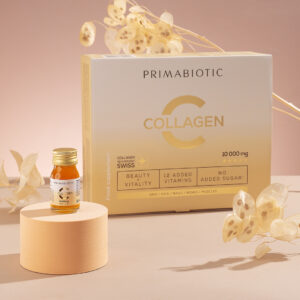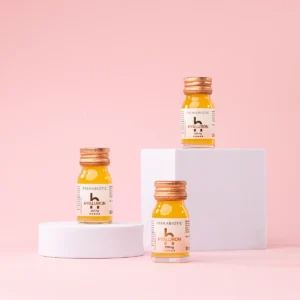
Collagen and Hyaluronic Acid – What Are the Differences and Why Is It Worth Combining Them?
Collagen and hyaluronic acid are a duo loved not only by aesthetic medicine but also by daily inner care routines. Is it worth combining them in supplementation? Definitely yes – doing so can lead to noticeable results such as firm, healthy skin and strong joints. Which form is best absorbed, and why is it not always a good idea to look for everything in one product? We answer the key questions and provide tips on how to use them effectively – for the benefit of your skin, hair, and nails.
Collagen – What Is It and What Are Its Benefits?
Collagen is one of the most important structural proteins in the human body, serving as a key component of connective tissue. It is responsible for the strength and elasticity of the skin, hair, nails, as well as bones and joints. Natural collagen production declines with age, leading to signs such as loss of skin firmness, wrinkles, and weakened hair and nails.
Collagen supplementation – especially in the form of bovine-derived collagen peptides (such as in Primabiotic Collagen) – supports the regeneration of skin structures, improves hydration, and enhances skin firmness. Additionally, the presence of vitamins (e.g., C, E, D, A, and B vitamins) and minerals (such as zinc) in the supplement helps support the regenerative processes and metabolism of the skin, hair, and nails.
What does collagen help with?
Instrumental studies conducted after 90 days of supplementation with Primabiotic Collagen showed:
- increased hair thickness,
- reduced depth of wrinkles,
- improved skin elasticity and firmness,
- reduced cellulite,
- improved nail appearance.
What Are the Benefits of Hyaluronic Acid Supplementation?
Hyaluronic acid is a polysaccharide naturally present in the body, acting as an intense “moisturizer” for tissues. In the skin, it plays a crucial role in maintaining proper moisture levels, which contribute to firmness, elasticity, and a smooth surface.
Supplementation with hyaluronic acid – especially in a formula combining high-molecular-weight and low-molecular-weight sodium hyaluronate (as in Primabiotic Hyaluron) – supports skin regeneration and hydration from within. This can lead to wrinkle reduction and improved skin smoothness. The supplement also includes vitamin C, niacin, biotin, coenzyme Q10, and zinc, which enhance the effects of hyaluronic acid and further support skin appearance.
What does hyaluronic acid supplementation do?
Instrumental studies conducted after 90 days of supplementation with Primabiotic Hyaluron showed:
- improved skin firmness and elasticity,
- smoother skin texture,
- better skin hydration,
- overall improved skin appearance,
- reduced visibility of wrinkles.
Collagen vs. Hyaluronic Acid – Key Differences
Hyaluronic acid and collagen are two essential components of the skin, but they differ in structure, function, and origin.
Collagen is a structural protein that forms the framework of the skin, providing strength and elasticity. In supplements, collagen is most commonly derived from animal tissues such as bovine skin and bones, fish skins, or chicken cartilage. The extraction process involves enzymatic hydrolysis, resulting in easily absorbable collagen peptides.
Hyaluronic acid, on the other hand, is a polysaccharide with powerful moisturizing properties. It fills the space between skin cells, helping maintain hydration and skin volume. While it was traditionally extracted from animal tissues such as rooster combs or bovine skin, today it is most commonly obtained through bacterial fermentation (e.g., using Streptococcus or Bacillus subtilis), which is considered a more ethical and sustainable method. This allows for the production of pure hyaluronic acid in different molecular forms – high-molecular-weight and low-molecular-weight.
These structural and sourcing differences influence how each ingredient works and is used in both supplementation and cosmetology. The comparison below highlights the key distinctions between collagen and hyaluronic acid.
Table: Key Differences Between Collagen and Hyaluronic Acid
| Feature | Collagen | Hyaluronic Acid |
| Structure | Structural protein | Polysaccharide (complex sugar) |
| Natural occurrence | Skin, tendons, bones, cartilage | Skin, synovial fluid, connective tissue |
| Main function | Maintaining skin elasticity and firmness, supporting joints and bones | Skin hydration, water retention, “filling in” wrinkles |
| With age | Decreased production and quality of fibers | Decreased skin hydration and hyaluronic acid volume |
| Effects of supplementation | Improved skin firmness and elasticity, reduced wrinkles, support for hair and nails | Improved hydration, smoothness, and skin elasticity |
| Form in supplements | Most commonly: collagen peptides in liquid or powder form | Most commonly: sodium hyaluronate in liquid or capsule form |
| Supportive ingredients | Vitamin C, E, biotin, zinc, B-complex vitamins | Vitamin C, Q10, niacin, biotin, zinc |
| Primabiotic product | Collagen with vitamins, peach-apple flavor | Hyaluron with vitamins, mango flavor |
Can Collagen and Hyaluronic Acid Be Combined?
Yes, combining collagen and hyaluronic acid is not only possible but also highly beneficial for those who want to take comprehensive care of the appearance and health of their skin, hair, nails, and joints. These two ingredients work synergistically – meaning they complement and enhance each other’s effects.
Collagen is one of the key structural proteins of the skin – it supports firmness, elasticity, and resilience to micro-damage. Supplementing with collagen can help rebuild the skin’s natural structure, leading to improved density, tightness, and overall condition.
Hyaluronic acid, on the other hand, is known for its exceptional moisturizing properties – it binds water within the skin, improving elasticity and smoothness. For this reason, it’s often called a “natural filler” and is widely used in aesthetic cosmetology.
Combining these two ingredients can support skin regeneration, reduce the appearance of fine lines, and enhance the skin’s natural glow. What’s more, the synergistic action of collagen and hyaluronic acid may also positively impact the condition of hair and nails – making them stronger, more flexible, and less prone to damage.
Regular supplementation can therefore be a valuable addition to your daily skincare routine – especially for those dealing with dry skin, loss of firmness, or weakened hair and nails due to aging, stress, or lifestyle factors.
Benefits of Combining Collagen and Hyaluronic Acid
Consistent use of both supplements may result in:
- Increased skin firmness and elasticity,
- Reduction of wrinkles and smoother skin texture,
- Improved hydration and long-lasting skin moisture retention,
- Strengthened hair and nails,
- Reduced visibility of cellulite,
- Overall improvement in skin appearance and health.
Instrumental and survey-based studies conducted on Primabiotic products confirm the high effectiveness of both ingredients.
Hyaluronic Acid and Collagen – Which Form Should You Choose?
Choosing the right form of supplement is crucial for both its effectiveness and ease of use. Liquid preparations, such as Primabiotic Collagen and Primabiotic Hyaluron, are especially recommended due to the following benefits:
- Better bioavailability – Active ingredients in liquid form are absorbed more quickly and efficiently by the body than solid forms like tablets or capsules.
- Convenience – Liquid supplements are easy to dose and can be taken on their own or mixed into your favorite drinks.
- Gentler on the digestive system – No need to swallow large pills or capsules, which is ideal for those with sensitive stomachs.
- Natural ingredients – Primabiotic products contain natural flavors and fruit juices (apple, mango, lemon), improving taste and making daily supplementation more enjoyable.
- Enriched with vitamins and active ingredients – These formulas include vitamins C, E, D, A, B6, B12, biotin, niacin, coenzyme Q10, and zinc to support comprehensive care for skin, hair, and nails.
However, it’s important to note that for real, noticeable effects, collagen and hyaluronic acid should ideally be taken as separate supplements – each in a sufficiently high and concentrated dose. Attempting to combine all ingredients into a single supplement often leads to low concentrations of key components – especially collagen and hyaluronic acid – which can limit the product’s effectiveness.
Therefore, a far better approach is to combine two complementary products – Primabiotic Collagen and Primabiotic Hyaluron – taken in parallel, for example, one in the morning and the other in the evening, or both during the day. This way, you’re delivering the right amounts of key substances to your body without compromising on quality or diluting the effects.
Check out other articles:

